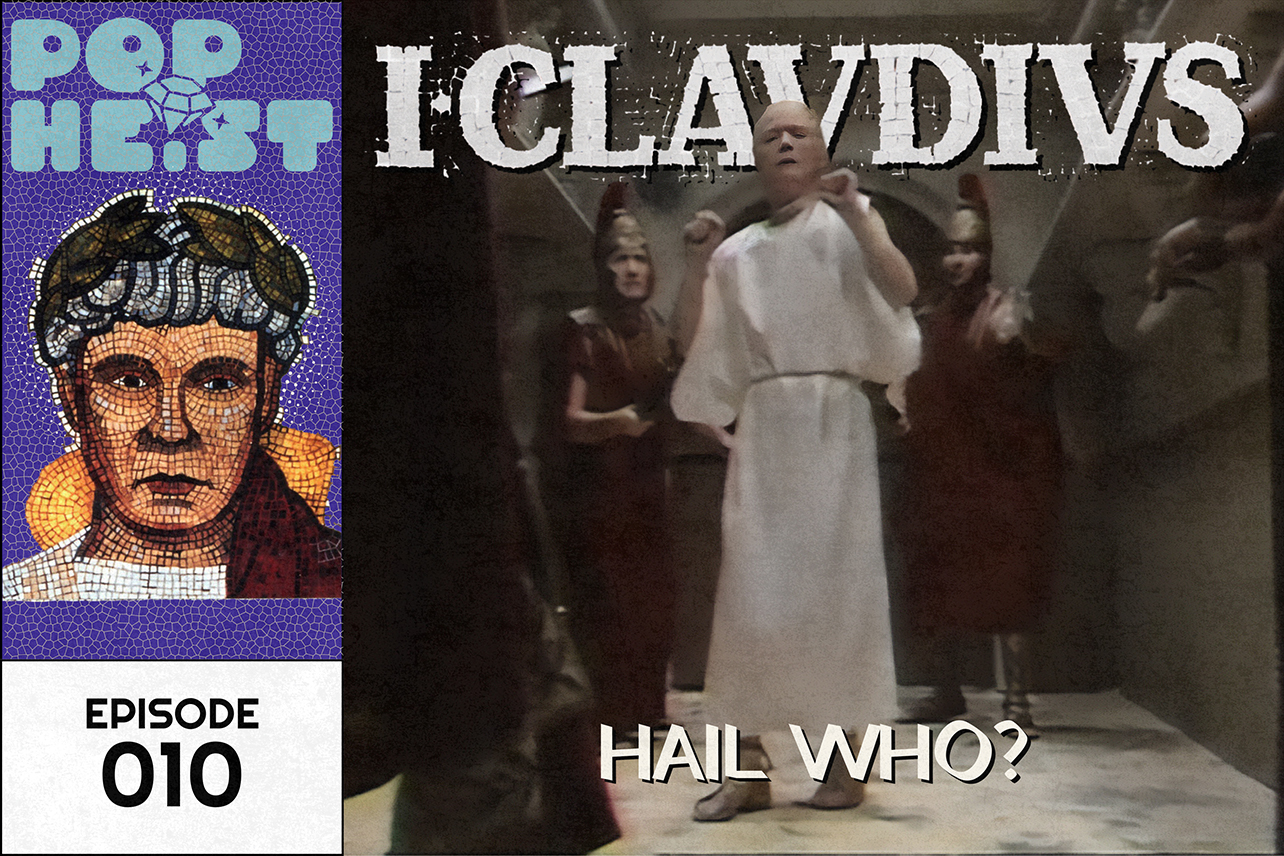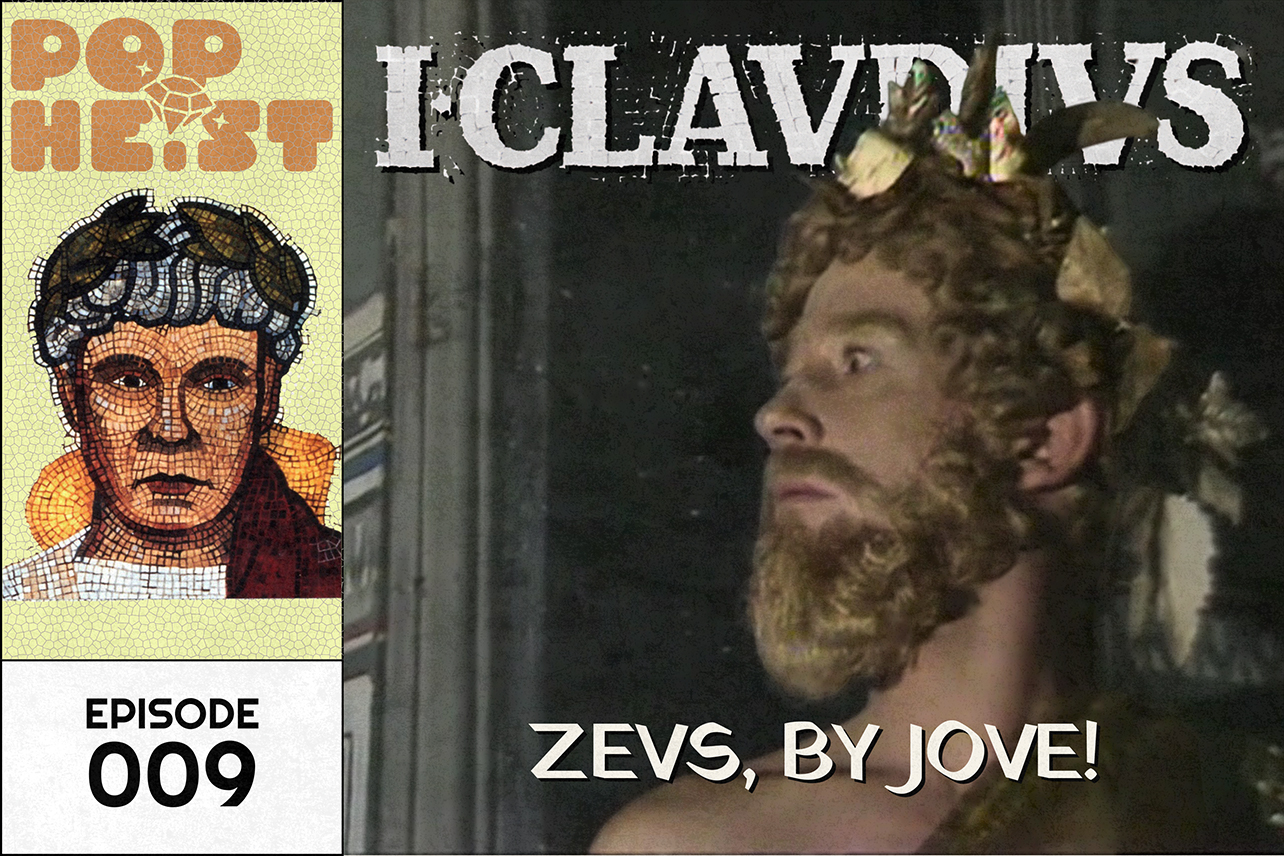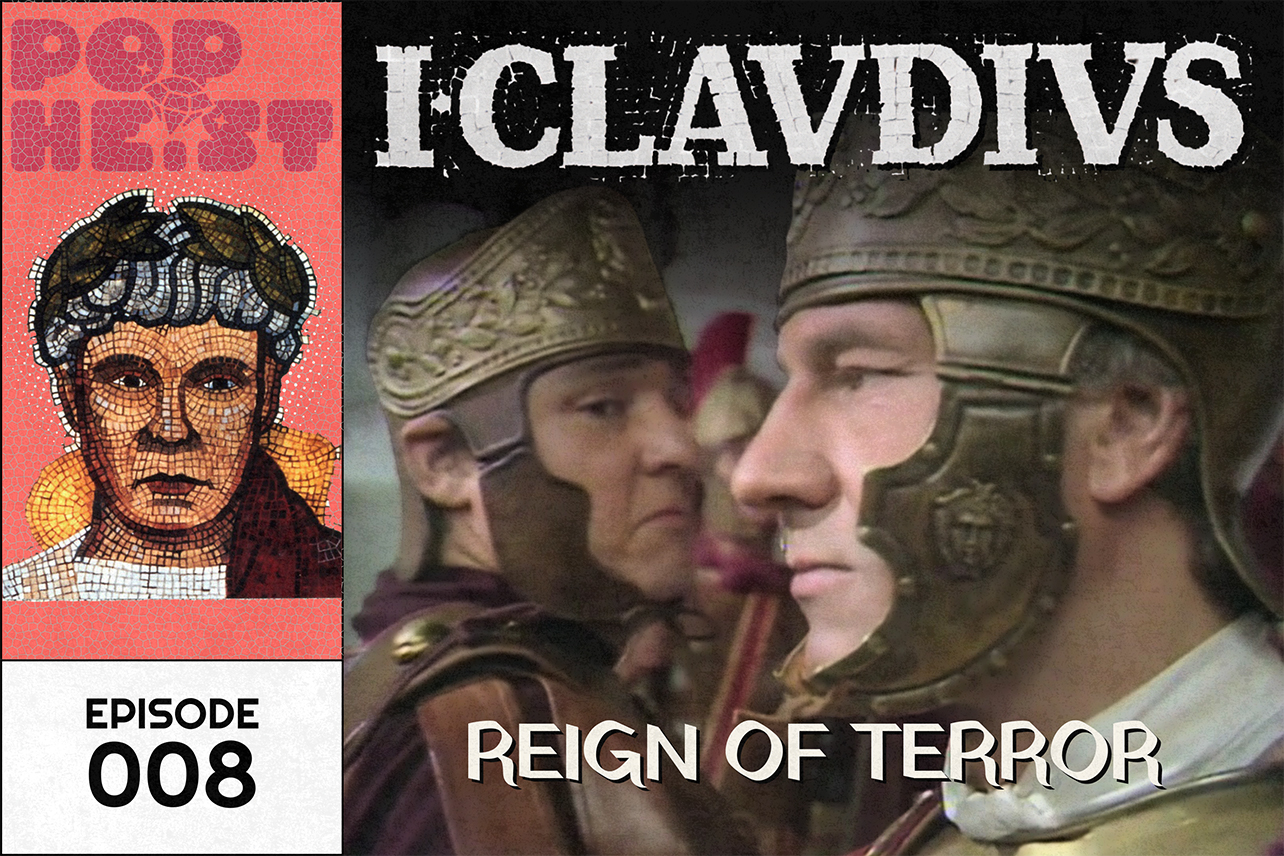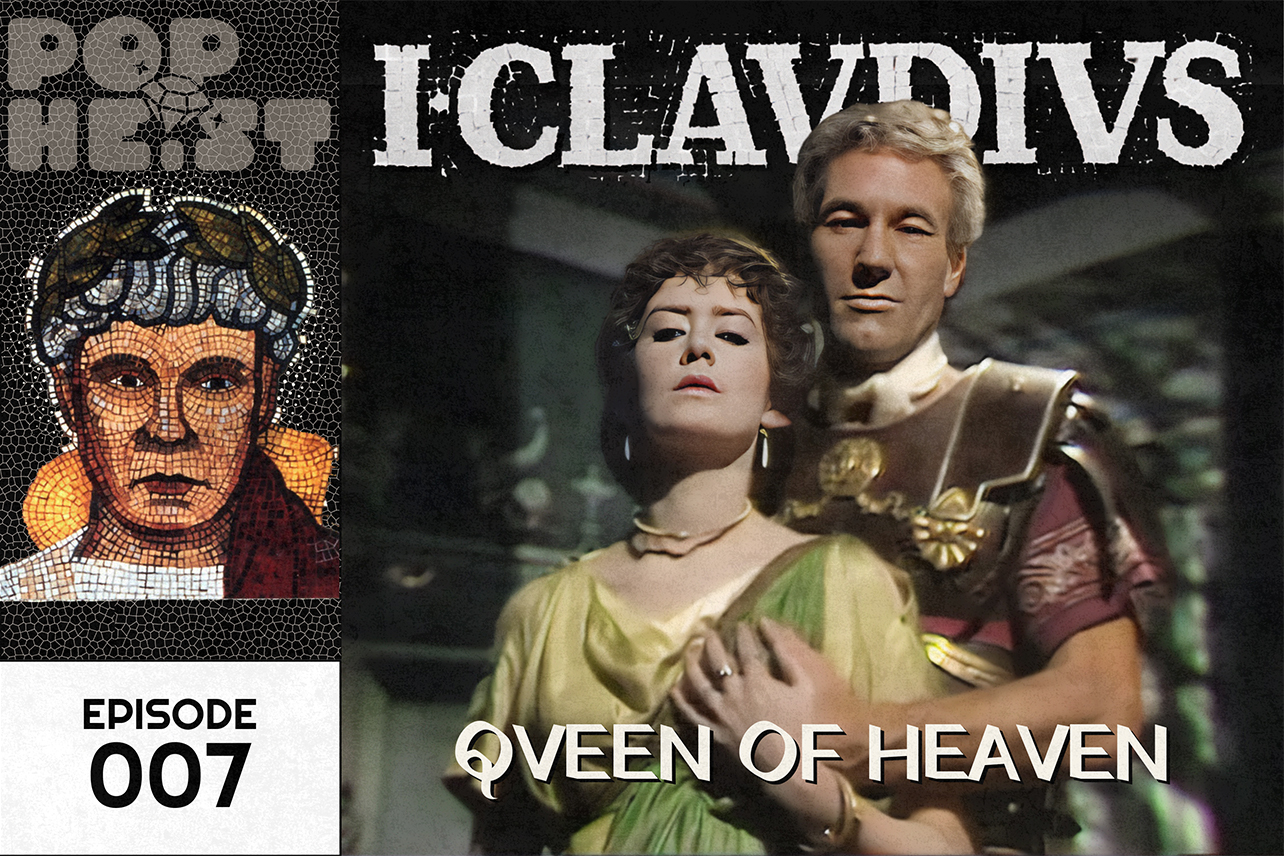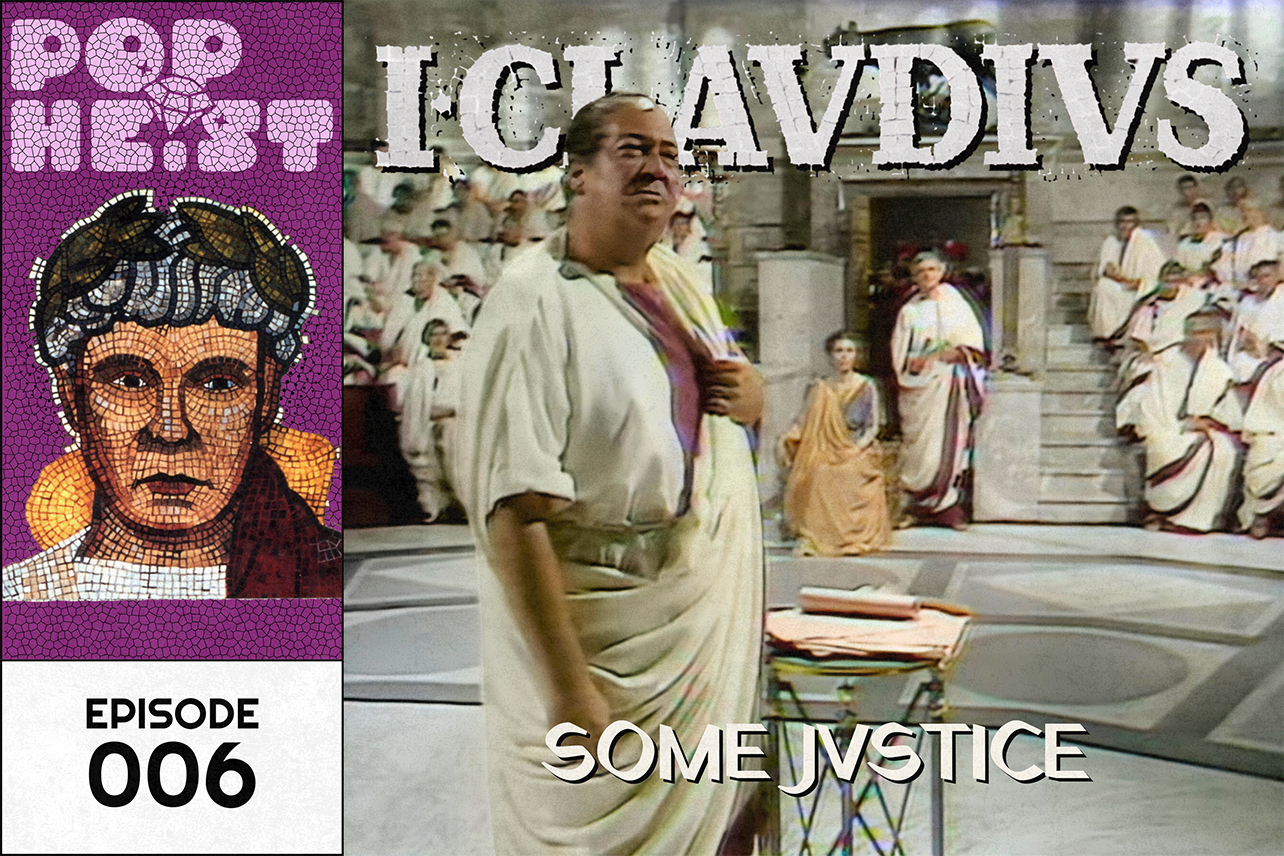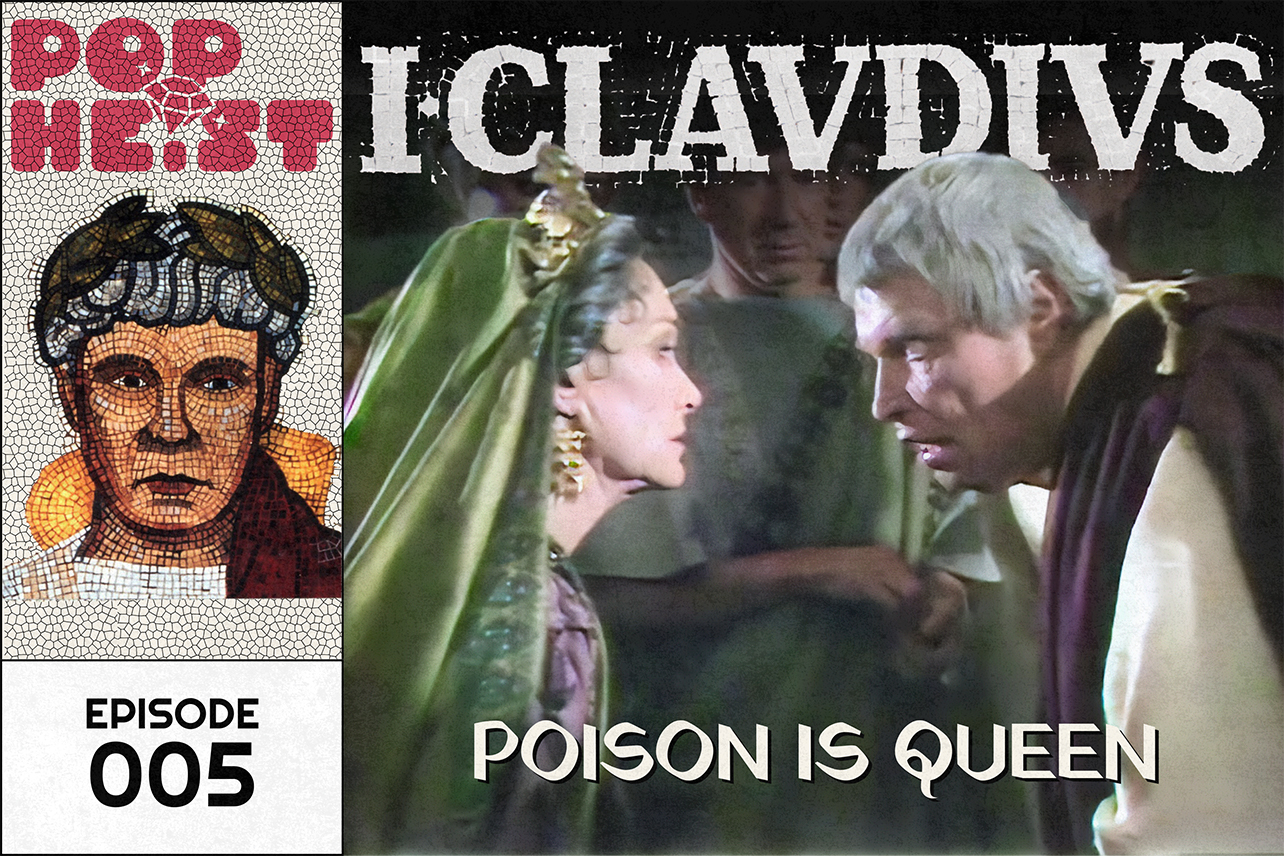In PRESTIGE PREHISTORY, Pop Heist critic Sean T. Collins takes a look at classic TV shows that paved the way for the New Golden Age of Television — challenging, self-contained series from writers and filmmakers determined to push the medium forward by telling stories their own way.
I, Claudius Episode 10
"Hail Who?"
Original Airdate: November 15, 1976
Writer: Jack Pulman (based on the novels I, Claudius and Claudius the God by Robert Graves)
Director: Herbert Wise
Cast: Derek Jacobi, John Hurt, Freda Dowie, Sam Dastor, Sheila White, Jo Rowbottom, Norman Eshley
They get closer than anyone has, I'll give them that. The conspirators who take aim at the mad Emperor Caligula in this episode of I, Claudius succeed in slaying the tyrant, and for the first time they're not doing it so they can take his place.
It's payback for years of depravity and abuse, ranging from the severe — the murder of countless nobles and the rape of their wives in his palace "brothel" — to the merely maddening — a constant stream of joking threats, threatening jokes, insults, humiliations, and blistering denunciations that turn to all is forgiven laughter for reasons best understood only by Caligula himself.
It's an impossible way for anyone to live. It's an impossible way for a nation to live.
Enter Cassius Chaerea (Sam Dastor), the severe and unsmiling new commander of Caligula's guard.
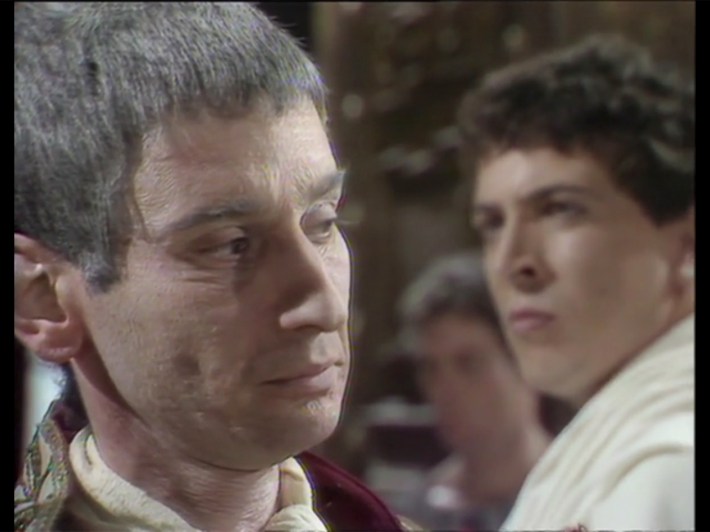
Promoted for his bravery in the field, he's subjected to the daily horrors of Caligula's reign like few others. Though it at first seems like he's cut from the same thuggish cloth as previous men in the position, like Sejanus and Macro, Cassius isn't like that at all. He hates what Caligua is doing, not just to Cassius and his men but to all of Rome. What's more, he knows it's only a matter of time before he says or does the wrong thing, or Caligula receives his latest insane brain transmission from Olympus, and Cassius and all his allies end up dead.
Acting in concert with a senator and Consul, Marcus Venicius (Norman Eshley), who's fallen out of favor with his brother-in-law the Emperor and repented of his wicked ways, Cassius and a handful of hand-picked soldiers and senators plot out the hit. They'll lure Caligula from his royal box on the last day of the latest Games down at the Forum and kill him in a narrow corridor where they control the entrances and exits.
Marcus' increasingly desperate attempts to lure Caligula make for nail-biting television: What if it doesn't work? What if they miss their last best chance? They go for it because of concept they still hold dear: "Liberty."
When these guys come at the king, they don't miss, of course. The assassins stab Caligula, who dies screaming: "I'm a god! You can't kill me!" His last word is the name of the sister he horrifically murdered last episode. It's nice, I suppose, to know something was capable of haunting that monster. Anyway, good riddance.
But Cassius has grander ambitions, it seems, than simply eliminating one madman: He wants to extinguish the royal line. With their trademark brutality, he and his men kill Caligula's infant daughter, as well as his wife Milonia (Freda Dowie, who also played the prophetic Sibyl in the first episode).
Milonia's a sad and fascinating figure, a good person who loves her daughter and Claudius and, somehow, her awful husband. Despite her low birth, older age, and lack of knockout looks, he keeps her around seemingly because he knows she actually does care about him, and that's rare indeed. At one point she keeps him from slaughtering the Senate with the same "let's not ruin an auspicious day with violence" excuse that the Sansa and the Hound employed to keep Joffrey from killing that one drunken knight in Game of Thrones that time.
Cassius is moving quickly because other factions will soon mobilize. The palace guard, whom he gave the day off to visit the Games, rush back to the palace to loot it. The German guard, Caligula's hand-picked blue-eyed blond-haired barbarians with no allegiance to anyone but him, are the people Cassius is really worried about.
As usual on this show, he overlooks the one person he shouldn't. Caligula's uncle Claudius somehow escapes the Games amid the chaos and makes his way back to the palace, where he does what any reasonable person would do and hides behind the curtains, hoping not to be spotted. No such luck. But though he's initially mistaken for a conspirator, one of the guards (Norman Rossington) recognizes him as the half-wit stammerer uncle of Caligula — the bottom of the barrel of the royals, perhaps, but a royal nonetheless.
And here's the thing, the guard explains to Claudius: If there's no Emperor, there's no Praetorian Guard, and they all get sent from their cushy gig at the palace back into the field as regular army. Meanwhile, he notes that unless the Germans have an emperor to follow, they're apt to go berserk. So it's best for Claudius to pour himself a big ol' goblet of shut the fuck up about restoring the Republic and accept his new job: Emperor of the World.
It's a funny moment for sure, but a grim one also. There's obviously lots of mockery in the Praetorians' promotion of Claudius to the Emperor's curule seat: The only reason he's still alive is likely because Cassius himself didn't think that much of him either, certainly not that he'd be a viable replacement Emperor. But Cassius arrives at the palace too late: the guards have already hoisted Claudius aloft, crowned him with golden laurels, and made him the most powerful person in Rome. If Cassius, too, had hoped to restore the Republic — recall that the watchword for the conspirators was "liberty — those hopes are now dashed, against the will of the very man being used to dash them.
It's a nightmarish scenario to end a fascinating episode. It is, of course, the last hurrah of the spectacular John Hurt as Caligula, which means it's the last time we're going to hear one of the most distinctive, melodic, terrifyingly powerful voices in the history of cinema. The way Hurt lets his raspy delivery sink into a purr, flitter into flights of laughter, or rise in volume and intensity until it sounds like he really is an angry god, is all-timer work on a show full of all-timer work.
Will I miss him? Oh, absolutely. But I also missed Augustus, Julia, Livia, Livilla, Sejanus, and Tiberius, and we're getting along fine without all of them, aren't we? I've never seen a show that goes through its core cast at this rapid a clip — Claudius is the only character in this episode who appeared in any of the first five — and never suffer a drop in quality, or the sense that the writing is flailing around looking for the next thing to do. I don't see any reason why Caligula's death should deal more of a blow to the show than any of the others, Livia's in particular.
At least he goes out with a bang. You get some real Emperor Caligula's Greatest Hits shit in this episode: the orgies at the palace, the non-stop murders and sex crimes, the presentation of a treasure chest full of seashells as the plunder from his ongoing war with the god Neptune, the introduction of a horse as a senator. (Really good horse acting, I have to say. He hits his marks without having anyone guide him!)
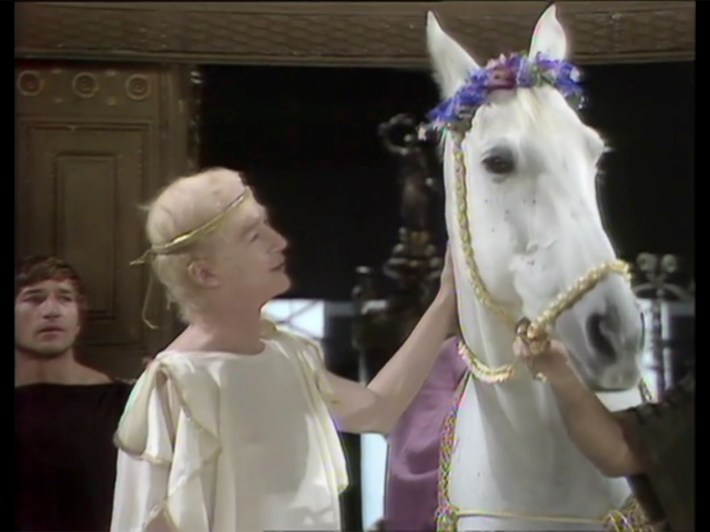
At one point he grows so angry with Claudius he finally does try to have him killed by ordering his soldiers to throw his uncle in the river. When Claudius — who remains offscreen for several very tense minutes following an audible SPLASH! sound effect — manages to swim back to the shore, he returns to Caligula's tent covered in enough mud to look like he played bass for Nine Inch Nails during Woodstock '95. Caligula is so tickled he spares his life and everyone else's, for the time being.

In a moment that approaches lucidity, albeit distantly, Caligula even asks Claudius if he's ever suspected he might be mad. Oh no, Claudius assures him — surely that's just the strain of maintaining his mortal disguise wreaking havoc on his body and brain. It ain't easy being god.
In the episode's most striking sequence — well, other than the one where they strike him with a bunch of swords I suppose — Caligula summons Claudius, Marcus, and another senator to the palace in the middle of the night. The three men are forced to wait for hours, finally holding each other's hands for comfort at Marcus' request. What a powerful moment that is, these men trying to care for each other in what they believe are their last minutes on earth.
Instead, they are treated, if that's the word for it, to a command performance of a musical number about the rosy-fingered goddess Dawn, staring, you guessed it, Emperor Caligula as the goddess in question.
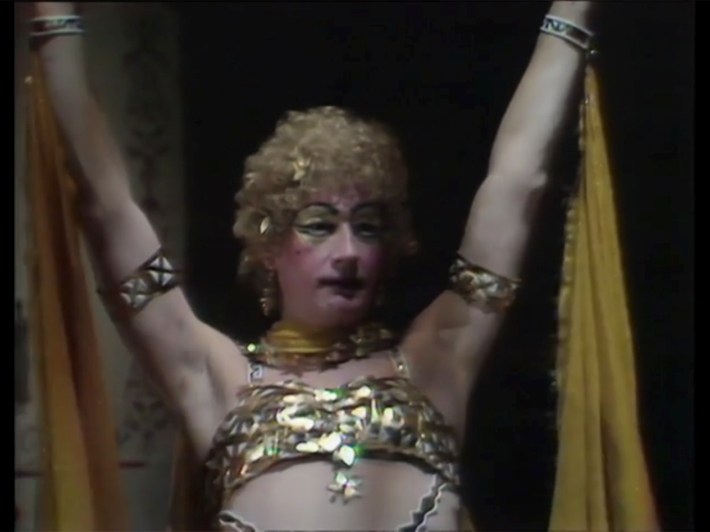
Dressed in gold lingerie, as if someone mixed up the costumes for Rocky Horror and Frank N. Furter, he's a terrible dancer — and a worse makeup artist, yeesh.
In the end he forces Claudius to marry one of the other performers, a sweet, doe-eyed young woman named Messalina (Sheila White).

When she looks up at him, asking if he thinks he could ever find it himself to love her, he replies, his stammer suddenly terrible once more, "I think…I'm in l-l-love with you already." I don't foresee any problems here, that's for sure!
Problem number one, I would assume, is his live-in prostitute girlfriend, Calpurnia (Jo Rowbottom), with whom Claudius lives on the poor side of town out of fear of getting too close to his nephew. But he's used to having to go against his own good judgment, as he must when Caligula forces him to serve as the doorman and, incredibly, bouncer at the palace brothel. With surprising personal heroism, Claudius rescues a woman who'd recently given birth from being forced into participating, then gives her would-be "client," Marcus, such a beating that I think it's what sets him on the road to reform. But if Caligula orders him to dump his gf and marry some new woman, he's never been the type to say no.
All of this stuff about Caligula is true, or true-ish. I've seen an interesting theory that a lot of the craziness presented straightforwardly in the histories was really just a clever, kind of unhinged guy making fun of all of Rome's most hallowed institutions, from the army to the Senate. You can see how even this watered-down version of his actions would be less than endearing to endure, though.
His demise makes for another shocking and indelible episode. The shocking parts are obvious. The orgy is a bacchanalia of men making out — on camera, on the BBC, in 1976 — and women with their tits out. Caligula's performance is, as Claudius stammers, "indescribable." (I'm aware that in the 1970s in particular, drag performers and trans women were often used as singposts for decadence and depravity; I've chosen to focus on the fact that his dancing really sucks.) The final man to drive a blade into his his heart says he's doing it for all their wives; Caligula's own wife, and their baby, are then brutally murdered.
(On a more minor note of surprise, perhaps because this is the episode in which Claudius becomes Emperor, it's the first not to begin or end with the customary framing device of an elderly Claudius writing his family history. I was pretty confused there for a second!)
But it's Hurt that makes this episode, and his astonishing rapport with Jacobi. Watch that scene where they sit and talk in Caligula's waterlogged war tent after Claudius resurfaces from the river. The two men look, sound, think, and act nothing alike at all, but there's something about Claudius that has always intrigued Caligula no matter how mean he may be during one his episodes, and there's something about Caligula that Claudius has always understood better than anyone else.
I won't say their relationship is like Batman and the Joker's — although there's an argument to be made that John Hurt's Caligula is the best Joker yet committed to camera — but there is a connection there. When it's severed, you can feel it, and it's somehow sad despite it all. Caligula was a monster, but he was also a man in pain, intense physical and psychological anguish. It can't be easy waking up and having no idea what will happen because every day is a brand new reality. Exhilarating in the moment? Of that much we can be sure: We've heard his mad laughter.
But if it's all a big joke to him, why does he die screaming his murdered sister-wife's name? And what sins will catch up with Claudius when his time inevitably comes?
